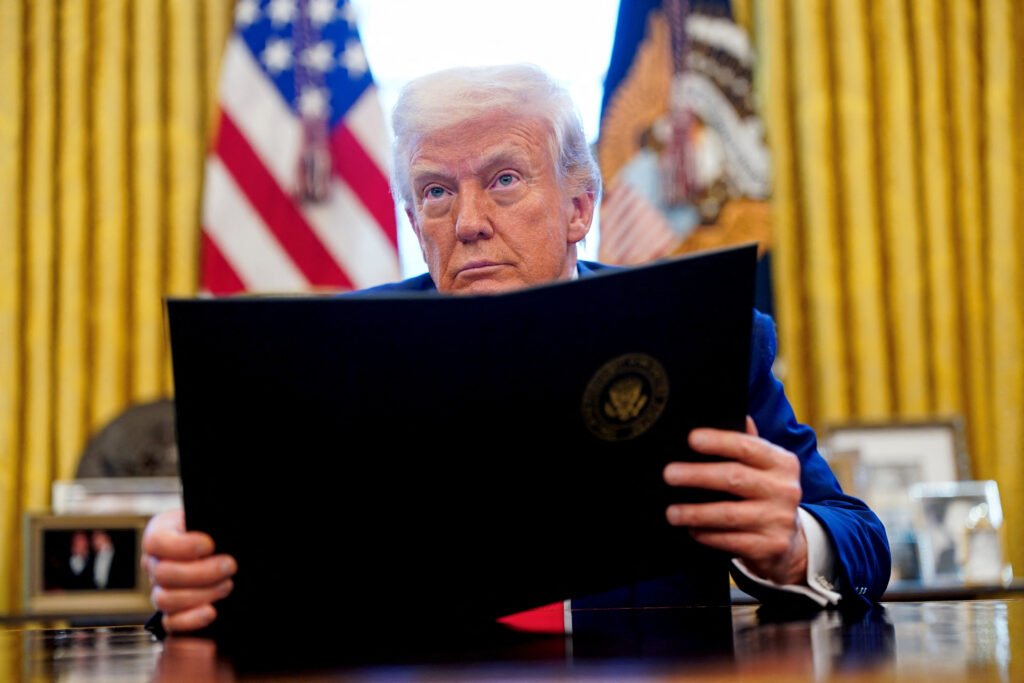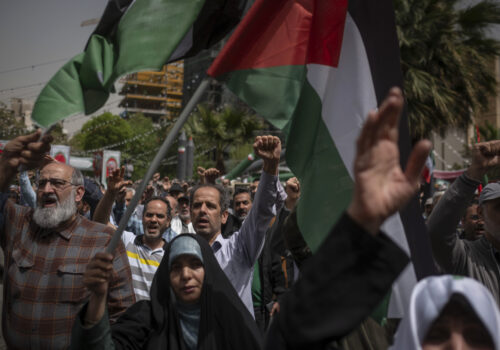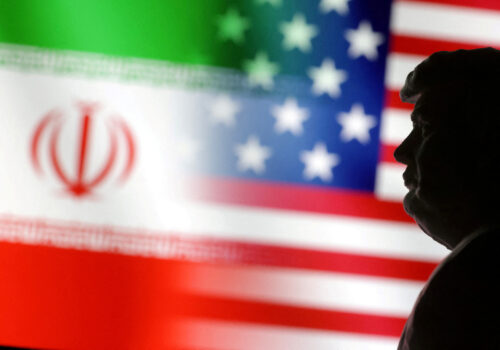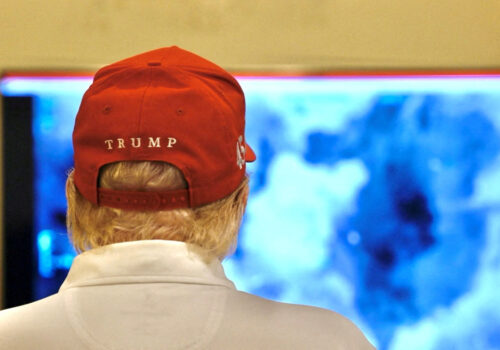In February 2025, US President Donald Trump designated a series of cartels as Specially Designated Global Terrorists and Foreign Terrorist Organizations (FTOs), including Tren de Aragua (TdA) and Mara Salvatrucha (MS-13), among others.
Previously, the US Treasury Department sanctioned MS-13 as a Transnational Criminal Organization under Executive Order 13581. The Trump administration similarly designated Foxtrot, which has been used by Iranian intelligence, under the same authority last month.
This should lay the groundwork for Washington to respond to an increasingly aggressive Iran, which has rallied more extraterritorial operations in both the United States and Europe, using a network of criminal gangs.
The statutory criteria for the Secretary of State to designate FTOs are as follows: it must be a foreign organization; the organization must engage in terrorist activity or retain the capability and intent to do so; and it must threaten the security of US nationals or the national security of the United States.
Washington and its allies should capitalize on the momentum from the Trump administration’s increased designations and begin sanctioning these criminal networks as Foreign Terrorist Organizations (FTOs).
Iran’s expanding criminal gang network
Tehran has long offered a safe harbor and a platform for dangerous organized criminal syndicates to plot assassinations, kidnappings, and sabotage around the world. These partnerships with criminal gangs are often flexible, offering plausible deniability for Tehran’s attempts to silence its foes, especially in the West.
In a recently unearthed interview with Mohsen Rafighdoost, the former cabinet minister in charge of the Islamic Revolutionary Guard Corps (IRGC) in the 1980s, he admitted the regime employed the Basque separatist movement to carry out killings on its behalf in Europe. Both Iran’s Intelligence Ministry and the IRGC retain relationships with these organizations, which are non-Iranian and have access to the United States and Europe in ways that the Iranian regime itself lacks.
These groups include the Mocro-Mafia, which engages in murder-for-hire and drug trafficking across Europe. The organization was implicated in the attempted killing of Alejo Vidal-Quadras, a Spanish politician and former member of the European Parliament. Last year, the Mocro-Mafia’s leader, Riduoan Taghi, was sentenced to life imprisonment for his campaign of violence in the Netherlands, including the murder of an Iranian in Amsterdam. There is evidence that Taghi visited Iran multiple times to engage with the regime and was arrested in Dubai, from where he was plotting killings for Tehran.
Others include the Foxtrot Network, a criminal gang in Sweden that was responsible for an attack on the Israeli embassy on behalf of Iran’s Intelligence Ministry. There exists another such gang active in Sweden and beyond, Rumba, which enlisted a 14-year-old boy to engage in a shooting targeting the Israeli embassy in Stockholm. Iran was also behind that episode. Rumba is led by Ismail Abdo.
Thieves-in-Law, an eastern European organized criminal enterprise, schemed to assassinate journalist and activist Masih Alinejad on behalf of the Iranian government in New York. Two of its operatives were convicted in U.S. federal court last month for this crime. The IRGC has also employed the Hell’s Angels gang to commit arson attacks against synagogues in Germany, as well as the attempted murder of an Iranian defector living in Maryland. A leader of the Hell’s Angels, Ramin Yektaparast, found refuge in Iran until he was killed there in 2024. Narcotics trafficker Naji Ibrahim Sharifi-Zindashti, whom Iran’s Intelligence Ministry has contracted, has also used his network to enlist Hell’s Angels for similar Iranian extraterritorial operations. The Irish Kinahan Organized Crime Group likewise has links to Iran, which is thought to have afforded shelter for its leader.
The case for US FTO designations
The entities listed above are foreign organizations given their operations, predominantly throughout Europe. There are some questions as to the cohesiveness of some of the groups as formal organizations, but in cases where they exist, the Trump administration should sanction them as such.
These organizations also engage in “terrorist activity,” as defined by US law. Under the legal definition, “terrorist activity” can mean “assassination.” Given the long history of the Islamic Republic’s use of these criminal gangs, which engaged in both attempted and actual assassinations—for example, Thieves-in-Law—they have participated in terrorist activity. In the US State Department’s designation of Cártel de Sinaloa as a Foreign Terrorist Organization, it also cited its use of “violence to murder, kidnap, and intimidate civilians, government officials, and journalists.” Organizations like Hell’s Angels, Foxtrot, and Rumba have done the same, with attacks against Israel’s embassies in Europe, which were geared to threaten government officials there. Incidents of arson against synagogues in Germany—in which Hell’s Angels was implicated—also fall into this category.
Lastly, the Islamic Republic’s roving extraterritorial gangs undoubtedly threaten the security of US nationals or US national security. The documented history of their targeting of American citizens—for example Masih Alinejad—make them an acute threat. Their ability to penetrate U.S. soil also positions them as a risk to American national security, as successive Worldwide Threat Assessments produced by the US intelligence community have highlighted Iran’s commitment “to its decade-long effort to develop surrogate networks inside the United States” for violence.
SIGN UP FOR THIS WEEK IN THE MIDEAST NEWSLETTER
US Secretary of State Marco Rubio noted in his January confirmation hearing that Iranian surrogate groups “have long planned contingencies for attacks” against the American homeland. Should Washington and/or Israel decide to launch military operations to destroy Tehran’s nuclear program, Iran could potentially respond by activating these terrorist contingency plans, in part because they would camouflage Iranian complicity via use of non-Iranian criminal gangs to avoid the very US military escalation against Tehran that the Islamic Republic seeks to keep away from. This would enable the system to thread the needle in responding to such a US strike while attempting to duck a direct confrontation with the American military.
This very architecture, using criminal gangs, necessitates their designation as FTOs. The sanction would further reduce the space such groups have to operate on US soil, especially by criminalizing the provision of material support or resources to them. It would also pressure US allies and partners to sanction them under their respective national authorities. Trump has been creative in designating international cartels as FTOs. He should apply the same standard to those criminal syndicates under the tutelage of the Iranian intelligence services.
Jason M. Brodsky is the policy director of United Against Nuclear Iran (UANI). His research specialties include Iranian leadership dynamics, Iran’s military and security services, and Iran’s proxy and partner network. He is on X @JasonMBrodsky.
Further reading
Thu, Apr 10, 2025
Iran is at an unprecedented crossroads over its nuclear program
MENASource By Alex Plitsas
The Middle East is experiencing a rare re-alignment that puts Iran in an unprecedently vulnerable position.
Fri, Apr 11, 2025
The Iran nuclear talks are Trump’s decisive moment on military strikes
MENASource By Daniel B. Shapiro
Within a relatively short time, Donald Trump is likely to face the decision point on whether or not to pursue a military strike against Iran.
Thu, Apr 10, 2025
No, Iran didn’t abandon the Houthis. It just wants Trump to think so.
MENASource By
Instead of interpreting Iran's narrative shift as a break from the Houthis, we might see it as tactical storytelling. And the story's working.
Image: US President Donald Trump looks on, as he signs executive orders and proclamations in the Oval Office at the White House in Washington, D.C., U.S., April 9, 2025. REUTERS/Nathan Howard



